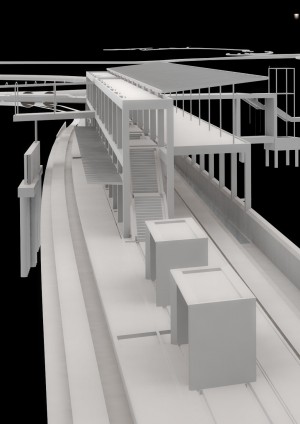
Information Academy
Document
type: Micro-report
Author:
Tahir Ahmad
Publication
Date: 26/02/2016
-
Abstract
In order to create the world class outcomes Crossrail desires, it required world class inputs; therefore having project team members, contractors and the supply chain to understand the Technical Information (BIM) strategy of Crossrail was imperative. The Crossrail-Bentley Information Academy encourages the delivery of best practice throughout the project supply chain with its unique focus on People, Process and Technology. The objective of the academy is to enhance internal and supply chain’s knowledge, to drive improvements, encourage best practice and facilitate the transfer of knowledge to other infrastructure projects. The academy provides an enabling force to all attendees to understand how Crossrail is managing information across multiple of linked technology platforms to create a ‘Single Source of Truth’ within a Common Data Environment. This document is relevant is to clients implementing a BIM strategy on a major project.
-
Read the full document
INTRODUCTION
Crossrail’s contractual structure presented Crossrail’s Information Management team with a unique problem of having to manage data deriving from disparate sources; which in turn derived from differing processes and procedures.
With 23 design contracts, 34 enabling works contracts, 56 construction & logistic contracts the complexity of packaging the information and creating relationships between different types of data was immense.
The Technical Information strategy was launched in 2008 to mitigate for the risks of an unstructured and uncontrolled data landscape by clearly defining the parameters of the deliverables which Contractors and Crossrail staff have to provide.
All Project teams working on Crossrail have been mandated to work within the Crossrail EDMS and ECMS with full compliance to all of the documented standards. An example of this is that all CAD files produced for Crossrail must be in the Bentley .DGN format.
With this level of definition, Crossrail needed to create standardised sets of data that could be relied upon for usage in other applications and in particular, for data migration (Handover) to LU and RfL.
As part of the change management process, Crossrail tackled the issue of culture and lack of awareness of BIM, by ensuring that alongside the Process and technology workstreams, People was the third ‘prong’ in the implementation of BIM methodologies.
INFORMATION ACADEMY
Having project team members, contractors and the supply chain understand the Technical Information (BIM) strategy of Crossrail was identified as essential to the success of the programme. Hence an Information Academy was established aimed at enhancing internal and supply chain’s knowledge, driving improvements, encouraging best practice and facilitating the transfer of knowledge to other infrastructure projects.
Leading the launch in 2012, Crossrail’s Chief Executive, Andrew Wolstenholme, was a major proponent of the Academy. Recognising the need for top down support for BIM related initiatives, the Academy presented opportunities whereby Crossrail could openly share information; and enable the supply chain to innovate and produce world class information deliverables.
“The Academy will support the Government Construction Strategy by increasing the use of BIM in the construction industry and creating a lasting legacy of best practice in innovation.”
With Crossrail hosting an environment where open discussions between client and contractors could occur on a commercial implication-free platform, opened up the channels for effective collaboration.
The Academy provided an enabling force for all attendees to understand how Crossrail was managing information across multiple, interlinked technology platforms to create a ‘Single Source of Truth’ within a Common Data Environment.
The desired outcome of the Academy was to provide an effective way to initiate Crossrail staff, Contractors and the Supply Chain to align efforts through common processes that advance information creation and information flow within the project, alluding to handover and ultimately operations and maintenance. Doing this enhances knowledge throughout the supply chain and ensures the understanding of the value of the information that is required by the project and that strategic goals are met in unison.
The tactical goals of the Academy were to:
- Advance Crossrail’s Engineering Information Management best practices
- Aid collaboration between client and employer
- Drive up standards
- Evolve solutions
- Capture and recycle lessons learned
The emphasis of the above goals was not to teach attendees how to use software via the provision of tutorials, but to offer a curriculum specific to the Crossrail’s asset portfolio via awareness sessions, forums, and hosting working groups. This was in order to realise maximum benefits in both capital expenditure and asset lifecycle, focusing on best practices.
The Crossrail-Bentley Information Academy facility consisted of a conference room capable of hosting up to 30 people at a time and housed 10 ‘Technology Pods’.
The ‘Technology Pods’, displayed training material based upon a mirror image of servers and desktop applications deployed at Crossrail. The complexity of the systems demanded strict adherence to processes, standards and file formats.
Creating these rules and helping project participants understand them is a major part of what the academy delivers. The ‘Technology Pods’ allowed a virtual immersion into Crossrail’s information systems, bypassing the red-tape of IT control and enabling the familiarisation with Crossrail’s processes in action.
For example, a document controller will have required the use of eB as well as the usual desktop suite of applications, the technology pods allowed access without risk to the live environment.
The academy was setup as a BIM theatre linking to live project databases and can also be utilised for design or construction reviews and briefing sessions with various project teams.
Due to the virtual nature of the academy environment, it was ideal for testing out innovative ideas. These could be an improved process, or a software or hardware change that needs to be trialled in laboratory conditions. The academy allowed attendees to investigate the impact of an idea on the existing systems or processes and the people/environment where it will be used.
The monthly ‘Crossrail BIM Overview Session’ was broken down to focus on the key areas of our BIM strategy, providing:
- An Overview of Crossrail’s BIM strategy
- Understanding of the Information Management approach
- Understanding and clear guidance on Asset Information management
- Understanding the use and benefits of Crossrail’s Geographical Information System
- Understanding and clear guidance on CAD data and model management
- An overview of Crossrail’s data migration (handover) strategy
Attendees at the Academy booked initially booked onto the course via direct interaction with course organisers during business as usual activities. As the effectiveness of this approach started to experience an organic decline, the course offerings were integrated within Crossrail’s learning and development core learning programme and bookable via the online training portal, Cross-Train.
A major boost to the Academy was the accreditation by CPD institute to distribute CPD certificates to those who attended the ‘Crossrail BIM Overview Session’; further validating the quality of information being delivered to attendees.
OUTCOMES
Based upon carefully constructed benchmarking methodologies, Crossrail provides the various contracts end of (4 week) period reports to provide a RAG status snapshot of performance and compliance within a number Technical Information disciplines.
Crossrail’s goal is to collaboratively convert unsatisfactory performance into world class. The typical problems which lead to poor performance is often a lack of awareness, lack of training, lack of understanding of CRL best practice principles and methodologies.
Crossrail launched the academy as an enabler for performance improvement, especially with our contractors. Therefore sessions at the Crossrail-Bentley Information Academy played a major role in creating and enriching awareness to ensure the Crossrail and delivery partner’s aims to be world class could be achieved.
Feedback of the Academy sessions were consistently positive, with attendees stating that they had a better appreciation of Crossrail’s information strategy and the value of data as an asset in itself, having attended a session.
Of key importance was the enablement of direct contact with Crossrail’s contractors and supply chain to ‘spot fix’ any information related issues.
LESSONS LEARNED
1. Crossrail’s technology partnership with Bentley Systems allowed Crossrail to utilise Bentley offices to run the Academy. This had both advantages and disadvantages:
(i) The neutral environment for Contractors, supply chain and other stakeholders to attend worked well to create an informal atmosphere for dialogue, focused on solution finding
(ii) The management of the Academy itself was undertaken by Bentley, it being part of their overall facility, as such, Crossrail lacked control over the booking and general availability of the room. This would need to be a consideration for future academies.
(iii) Due to the academy being in Bentley’s offices, there were instances of hesitation with regards to showcasing technologies from Soft vendors who were competitors to Bentley Systems.
2. The booking methodology of the academy should be agreed in advance to simplify the process for attendees.
3. If an Academy is run in collaboration with a technology partner or external organisation, the marketing teams from both organisations should agree on a consistent marketing approach so as to avoid disputes on intellectual property and non-compliance to a differing organisation’s communication policy.
-
Authors
Tahir Ahmad - Crossrail Ltd
BIM Co-ordination Specialist, Crossrail
Tahir Ahmad is the BIM Coordination Specialist for Crossrail in London. His current responsibilities include BIM performance analysis and improvement and management of the Crossrail BIM Information Academy: Enabling BIM strategies to work in practice.
Tahir is utilising his information management and business analysis background to launch and lead initiatives to champion BIM for Crossrail, extolling the efficiencies and outcomes integrated Engineering Information management can create. Leveraging the value of interoperable and accessible data sets allows informed, smart infrastructure management at every stage of a project from design to operations.
